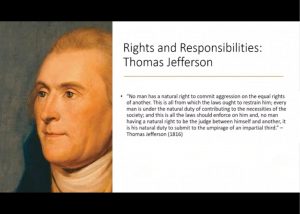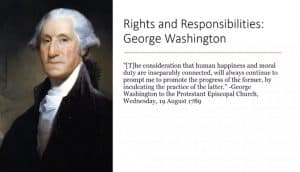Jon Harris is a historian, a theologian, and a podcaster with a growing audience. In this clip, Jon talks about what the Founding Fathers believed about rights. At minimum, we need to understand what the Founders believed and taught. Better yet, we need to recover and embrace their perspective in our day.

“Rights and Responsibilities: Thomas Jefferson”
“No man has a natural right to commit aggression on the equal rights of another. This is all from which the laws ought to restrain him; every man is under the natural duty of contributing to the necessities of the society; and this is all the laws should enforce on him and, no man having a natural right to be the judge between himself and another, it is his natural duty to submit to the umpire of an impartial third.” — Thomas Jefferson (1816)

“Rights and Responsibilities: George Washington”
“[T]he consideration that human happiness and moral duty are inseparably connected, will always continue to prompt me to promote the progress of the former [human happiness], by inculcating the practice of the latter [moral duty].” — George Washington to the Protestant Episcopal Church, Wednesday, 19 August 1789
ITEMS FOR REFLECTION AND DISCUSSION
Jon Harris’s paraphrase of Jefferson’s statement is as follows: “No government should infringe on your rights. No man should infringe on your rights, either, to do what you want to do with your stuff, to live your life as you see fit.”
What, then, is the government’s role? It is twofold.
-
-
- Stay out of your way.
- Keep other people from getting in your way.
-
That’s it!
Remember what we said earlier, during Session 2:
When government properly fulfills its God-given responsibility of punishing those who do wrong and commending those who do right, it protects the inherent, God-given rights of citizens.
The biblical basis for this is Romans 13:1-7 and 1 Peter 2:13-17, passages that explain government’s God-given responsibilities, as well as citizens’ responsibility to obey the government as it performs its God-ordained duty.
Keep in mind that doing “what you want to do with your stuff” presupposes that you are using “your stuff” to better your life and the lives of those you love, within moral and ethical guidelines. As Harris emphasized,
Rights and responsibilities go together.
ITEMS FOR REFLECTION AND DISCUSSION
-
-
- When a nation adopts the perspective on rights America’s Founders held, what are the risks to the citizens? What are the benefits? Why did the Founders believe the benefits outweighed the risks? Do you think the benefits outweigh the risks? Explain.
- How would most Americans today define rights? What are the problems with this, despite the good feelings that such a perspective engenders? Where will this perspective eventually lead a nation and its citizens?
- How can we help people rediscover and adopt the Founders’ perspective? To a large extent, the challenge involves helping people see beyond the moment, to the ramifications that come years from now. Yet this is the difference between liberty and bondage. Thomas Jefferson said, “I prefer dangerous freedom over peaceful slavery.”
-
The audio clip provided on this page is taken from this video. The video was released on August 10, 2020, is titled “The Founding Fathers on Rights and Responsibilities,” and is one of Jon Harris’s “Conversations That Matter” podcasts. Go here to visit Jon’s website, and here to visit his You Tube channel.
This page is part of a larger article or Bible study.
Teaching guide and study items copyright © 2021 by B. Nathaniel Sullivan. All rights reserved.
